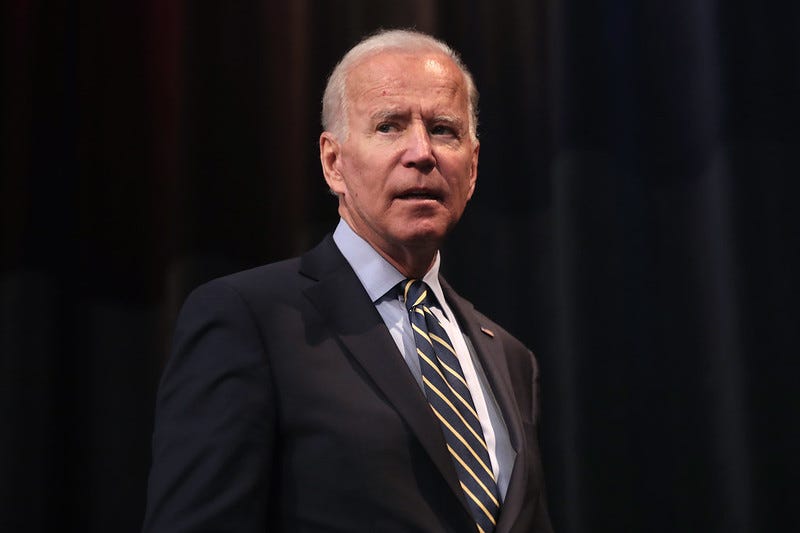Wake Up To Politics - September 20, 2021
Wake Up To Politics: Poetry, prose, and the Biden presidency
Good morning! It’s Monday, September 20, 2021. Election Day 2022 is 414 days away. Election Day 2024 is 1,142 days away.
Analysis: Poetry, prose, and the Biden presidency
“You campaign in poetry,” goes the dictum coined by the late New York governor Mario Cuomo. “You govern in prose.”
It’s a tidy saying, but it packs a deeper meaning. The adage represents an eternal truth in politics: The soaring promises of the campaign trail don’t always come true when faced with the harsh realities of governance. Or, to quote the fictionalized version of George Washington in “Hamilton” the musical: “Winning was easy, young man. Governing’s harder.”
Joe Biden may be a sought-after eulogist, but he isn’t exactly known for his soaring poetry. Instead, his campaign trail speeches often favored “more granular” phraseology over “lofty rhetoric,” as a former speechwriter told the Washington Post. As the Post put it, “he likes his language simple and direct” — no acronyms or complicated jargon, Politico has reported — which often means he seeks to distill his message into short, easy-to-remember slogans.
This weekend offered direct proof of Cuomo’s axiom, as many of those signature Biden slogans ran headfirst into the complexities of domestic and global politics.
At least three of them were dealt blows in a single hour-long stretch on Friday afternoon, as an FDA panel rejected Biden’s plan to offer Covid booster shots to all Americans, France recalled its ambassador to the U.S., and the Pentagon acknowledged its Afghanistan drone strike last month was a “tragic mistake.”
All three were embarrassing setbacks for Biden, and each cut against key promises Biden made on the campaign trail:
While the president pledged he would “follow the science,” the booster shot debacle was an example of Biden getting ahead of the science, announcing a plan to widely offer vaccine boosters before the necessary government scientists had signed on.
Upon taking office, Biden repeatedly promised allies that “America is back,” assuring foreign governments that the days of “America first” were over and the U.S. was back as a reliable partner on the world stage. The chaotic Afghanistan withdrawal had evoked some suspicion among allies. Now Biden’s new submarine pact with Australia has sparked a full-on diplomatic crisis with France, which saw its own submarine deal scuttled as a result of America’s actions.
Finally, the president promised to “end the forever wars” — and in recent weeks, has boasted it was a promise he achieved successfully. But the notion that Biden oversaw a clean exit from Afghanistan was complicated by Friday’s reveal that the U.S. military conducted a drone strike that missed its target and instead killed 10 civilians, including seven children.
These are exactly the type of snafus Biden promised he would avoid. Placing pressure on government scientists, getting into spats with allies, failed military operations — all were hallmarks of Biden’s attempts to contrast his governing style with Donald Trump’s.
With the president’s approval ratings continuing to slide, it’s easy to see the impact of these unraveling promises, as Biden “honeymoon phase” ends and voters begin to judge how he is faring in jumping from the “poetry” of running for office to the “prose” of running a country.
Can Biden rescue his nascent presidency and get his promises back on track? The following week will be instructive in multiple ways.
On the domestic side, Biden’s advisers like to boil down his entire agenda into yet another trite slogan: “Build Back Better.” The slogan is now a legislative behemoth, a $3.5 trillion bill that aspires to expand public investments in education, health care, child care, and more.
As both chambers of Congress return from recess this week, discussions in the Democratic cloakroom will be dominated by Biden’s sweeping spending package and its uncertain future.
The perils are manifold: House progressives say they’ll vote against Biden’s prized bipartisan infrastructure bill until the “Build Back Better” package advances. House moderates are insisting the bipartisan bill receive a vote next Monday anyways. Kyrsten Sinema is threatening to oppose the reconciliation package if the bipartisan bill fails. Joe Manchin thinks the whole thing should wait until 2022.
And at the same time his domestic agenda hangs in the balance, Biden also has his work cut out for him internationally. He’ll head today to New York City, where he’ll spend the week meeting with allies on the sidelines of the United Nations General Assembly, vying to assure them that “America is back” after all.
There is one more Biden campaign trail refrain worth examining as his administration turns eight months old today: His frequent pledge to “restore the soul of America,” a line inspired by his occasional collaborator Jon Meacham.
But despite Biden’s frequent paeans to unity, voters from across the political spectrum agreed in a new Fox News poll that the country remains as divided as ever. Only 37% of voters said the U.S. has become more united since Biden took office, compared to 54% who said the country has grown even less united during his tenure.
While Biden has stumbled in achieving many of his lofty goals, his call for national unity was probably his most poetic promise — and possibly also the one he has found the most difficulty realizing.
Mario Cuomo would hardly be surprised.
What else you should know
— Donald Trump is looking for Senate Republicans to challenge their leader, Mitch McConnell.
— Beto O’Rourke is planning a run for Texas governor.
— A Texas doctor says he performed an abortion in violation of the state’s new law, setting up a test of the statute’s legality.
Policy Roundup: Economics
On Mondays, Wake Up To Politics contributor Davis Giangiulio offers a briefing on the economic news to know this week:
Retail sales experienced an unexpected jump in August, a good piece of news in an economy that has been slowed in its recovery by the Delta variant. The Census Bureau released the data on Thursday, revealing that retail sales last month rose by 0.7 percent. This was compared to what was expected to be a 0.7 percent drop. However, despite the good news this month, July’s figure was revised to be even worse than previously thought, revealing a 1.8 percent decline last month, down further from 1.1 percent.
Overall, this data is a sign that the economy can and has been in some places strong even as the Delta variant has caused concerns about the recovery. Yet, there is still somewhat of a Delta effect in this data. Restaurants had zero growth in sales last month despite surging for months now, showing consumers have been skeptical about going out with the resurgent pandemic. And online sales rose significantly, up 5.3 percent, as people stayed home in greater numbers. But the fact sales are still strong is going to be one data point to show maybe Delta won’t derail the recovery entirely, especially as it came on the heels of downgrades to forecasts for the economy this quarter.
Poverty in 2020, despite a deep economic recession and the highest unemployment rate since the 1930s, actually declined. In the initial days of the pandemic, the New York Times wrote that coronavirus “appears to be setting off a devastating feedback loop with another of the gravest forces of our time: economic inequality.” This indictment on the virus was due to the disproportionate impact it was expected the virus would have on poor people not just health-wise, but especially economically. And there is no doubt the poor have suffered worse when it comes to the pandemic, as they were more likely to use money from their savings to get through the tough times or go to a food bank. Still, poverty declined during the pandemic year.
The poverty rate in 2020 was 9.4 percent, a fall from the 11.8 percent rate of 2019, according to the Census Bureau. The report credits pandemic economic programs, like stimulus checks and expanded unemployment benefits, for the unexpected fall, saying that it brought 11.7 million people out of poverty and prevented 5.5 million people from falling into poverty. To highlight even further how important this government intervention was, if you were to take stimulus benefits out of account the poverty rate would have increased to 11.4 percent from 2019. Those on the left take this as a sign that the social safety net should be expanded, as it can prevent many people from being hurt even in terrible recessions. But conservatives will argue that while it kept people out of poverty, it also kept people from getting back to work creating the problems surrounding labor shortages we have today. It’s a fundamental fight that will be tested as Congress debates social spending this fall.
Daybook
What’s happening in Washington today. (All times Eastern, unless otherwise noted.)
EXECUTIVE BRANCH
President Joe Biden will start the day at his vacation home in Rehoboth Beach, Delaware, where he spent the weekend. At 11 a.m., he will leave Delaware for the White House, arriving at 12 p.m. Biden will then receive his daily intelligence briefing at 12:30 p.m. before leaving at 3:55 p.m. for New York City, where the 76th United Nations General Assembly is being held this week. He will arrive at his Manhattan hotel at 5:10 p.m. and participate in a bilateral meeting with UN Secretary-General António Guterres at 6:30 p.m.
Vice President Kamala Harris will host a reception at 4 p.m. to mark the 50th anniversary of the Congressional Black Caucus.
Second Gentleman Doug Emhoff will travel to Milford, Massachusetts. At 11:10 a.m., he will visit a child care center to promote Biden’s plan to expand access to child care. Along with Rep. Jake Auchincloss (D-MA), Emhoff will tour the center, participate in the lunch service, and join the center’s educational activities.
White House Press Secretary Jen Psaki will hold her daily press briefing at 1 p.m.
LEGISLATIVE BRANCH
The Senate will convene at 3 p.m. Following Leader remarks, the chamber will debate the nomination of Margaret Strickland to be a U.S. District Judge for the District of New Mexico. At 5:30 p.m., the Senate will hold its final confirmation vote on the nomination of Veronica Rossman to be a U.S. Circuit Judge for the Tenth Circuit.
The House will convene at 2 p.m. Following one-minute speeches, the chamber will recess until around 4:30 p.m. Upon its return, the House will vote on five bills under suspension of the rules:
H.R. TBD, the Department of Veterans Affairs Expiring Authorities Act of 2021
S. 189, the Veterans’ Compensation Cost-of-Living Adjustment Act of 2021
H.R. 4172, to name the Department of Veterans Affairs community-based outpatient clinic in Aurora, Colorado, as the ‘‘Lieutenant Colonel John W. Mosley VA Clinic’’
H.R. 1281, to name the Department of Veterans Affairs community-based outpatient clinic in Gaylord, Michigan, as the “Navy Corpsman Steve Andrews Department of Veterans Affairs Health Care Clinic”
H.R. 3475, to name the Department of Veterans Affairs community-based outpatient clinic in Columbus, Georgia, as the ‘‘Robert S. Poydasheff VA Clinic”
JUDICIAL BRANCH
The Supreme Court is not in session.
Thanks for waking up to politics! If you enjoy reading this newsletter, I’d be so grateful if you’d consider donating to help support me and my work. If you want to show off your support for Wake Up To Politics, you can also buy some merchandise.
Also: don’t forget to tell your friends and family to sign up for the newsletter using your unique referral link. And if you have any questions or comments, feel free to email me at any time.







